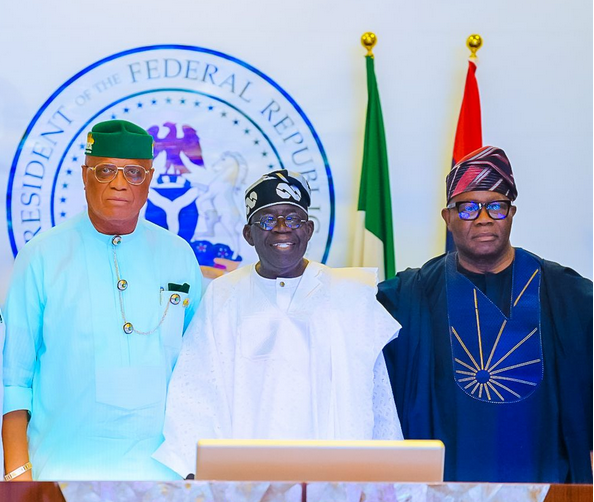The political air in Akwa Ibom was thick, not just with humidity but with the tension of a seismic shift. Governor Umo Eno, a man of sharp instincts and unblinking vision, had just crossed the political Rubicon, abandoning the wobbling umbrella of the PDP for the sturdy broom of the APC. To some, it was treachery. To others, sheer folly. But to those who see beyond the fog of partisan acrimony, it was a masterstroke. This wasn’t mere defection; it was strategic repositioning. While others played draughts, Eno was deep in a game of chess.
The man with the golden skin and the piercing gaze had read the signs, not in the stars, but in the cold calculus of governance. He saw opportunity dangling like low, ripe friuts ready for plucking. He saw jobs, infrastructure, and a future not of hollow promises but of tangible progress. And who stood at the door, beckoning? None other than Godswill Akpabio, the Senate President, a political colossus whose shadow is both imposing and gracefully fertile. Mention Akpabio in forum and market places in Uyo or the corridors of Abuja, and you’ll hear tales of his Uncommon Grace . He is a force of nature that transmutes dreams into concrete, bush paths into highways, and lethargy into motion. His legacy? The stadium, the airport, the five star hotels structures that scrape the sky where emptiness once crouched. His giant footprints are too many to count.
Umo Eno, ever the pragmatist, knew what alignment meant. This wasn’t just a party switch; it was plugging Akwa Ibom into Nigeria’s powerhouse. The dividends? They’re already materializing. Imagine the Ibom Deep Seaport, no longer an architectural sketch on a bureaucrat’s desk but a roaring reality. Picture the first mammoth vessel docking, its belly full of commerce, its presence heralding jobs, wealth, and a new economic dawn. The Igbo traders, those relentless calculators of profit, will descend like locusts on a harvest, turning our coastline into their new trading mecca.
And the airport? Forget the occasional whine of passenger planes. Soon, the skies will thunder with cargo jets with machinery from Germany, pharmaceuticals from India, fresh produce from Kenya, feeding an insatiable market. Businesses won’t trickle in; they’ll flood. Factories, tech hubs, logistics empires, all sprouting like mushrooms as the fruits of the new partnership. Tourism? Our beaches, our culture, will no longer be hidden gems but global attractions.
So here’s the gospel, served raw: Get ready. The industrial revolution isn’t knocking; it’s kicking down the door. Learn a skill. Weld, code, manage. Make yourself indispensable. Buy land. Not for petty kiosks, but for solid investments. When the port roars and the airport hums, real estate won’t just rise, it’ll explode.
Don’t mistake Eno for a starry-eyed dreamer. He’s a strategist, a man who plays the long game. He thinks in two tenses—the immediate calculus of survival and the far-reaching vision of legacy. Akwa Ibom, brace yourself. The future isn’t coming. It’s here.


